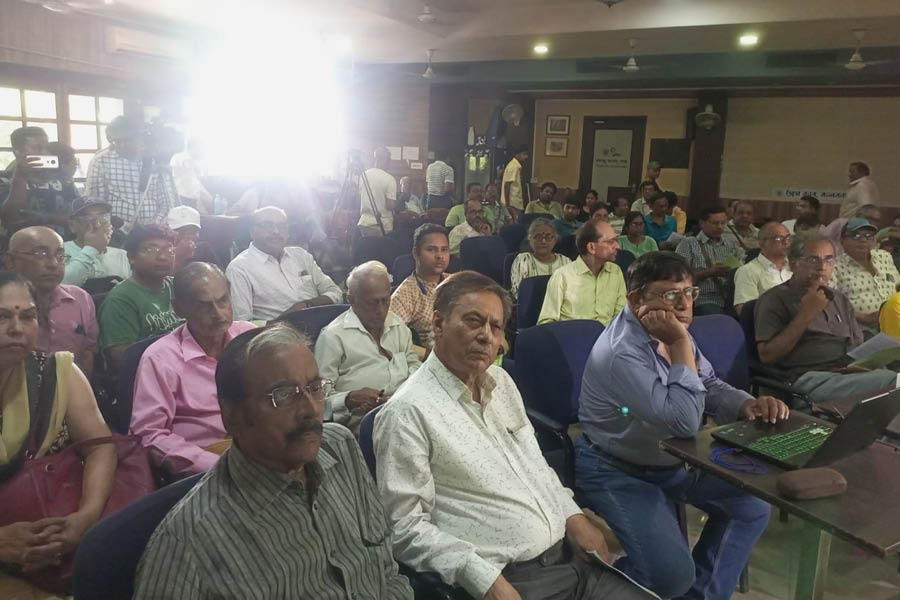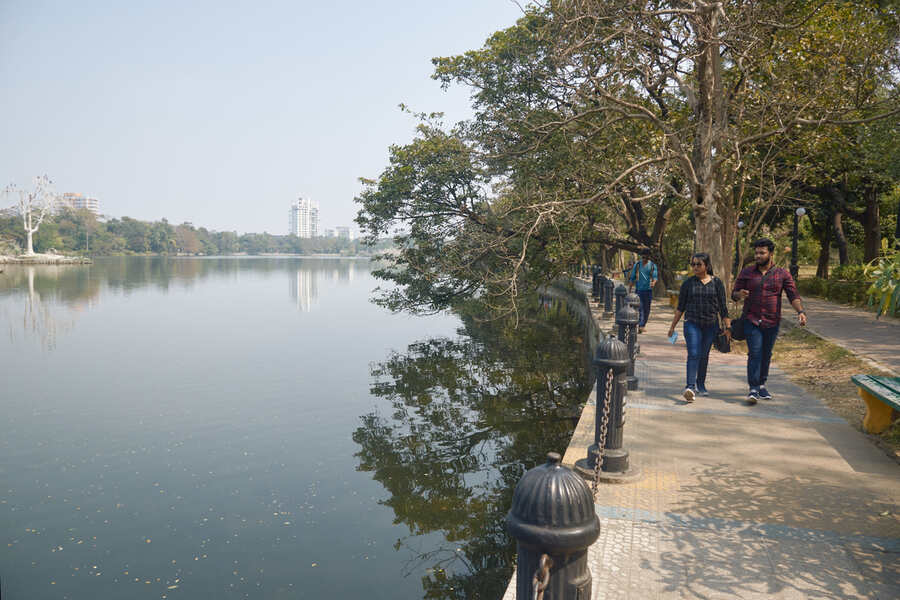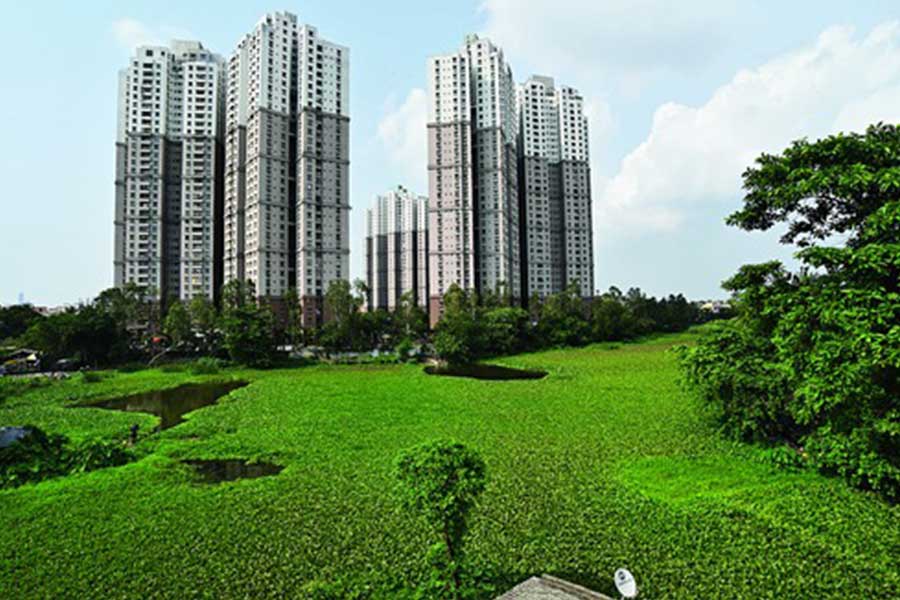Action on filling up of water bodies, including the East Kolkata Wetlands, illegal constructions, conservation of Adi Ganga, rising air pollution, noise menace, climatic impact and fast-sliding groundwater levels are some of the issues highlighted in a charter of demands released by environmental platform Sabuj Mancha on Tuesday.
The 32-page green manifesto was released at a meeting with representatives of various political parties in Kolkata ahead of the Lok Sabha elections.
Environmentalists and experts present at the meeting pointed out that the manifestos of almost all political parties hardly give importance to green issues and the situation has not changed over the years.
“Before the 2009 Lok Sabha polls, Sabuj Mancha had pointed out in a meeting that political parties do not give importance to environmental issues in their manifestos. The situation has not changed much in the past 15 years, with environment mostly being listed at or close to the end of their document, almost like a footnote,” said Naba Dutta, secretary of Sabuj Mancha.
Focus on air pollution
Bose Institute professor Abhijit Chatterjee cited studies to highlight how air pollution was affecting poor people in rural areas as well as in the slums of Kolkata. Pulmonologist Arup Haldar underscored the importance of documenting air pollution as cause of death, where applicable, to put pressure on the government to take urgent action on the issue. “Scientific studies say that there have been 6.7 million lakh air pollution triggered deaths annually in the world, but it is yet to get a mention in the death certificates … the system should change,” said Haldar.
“Environment-friendly modes of transport such as trams, cycle and water transport should be promoted,” said an expert. “It’s unfortunate that on one side, we are talking about climate change, on the other, we are gradually withdrawing trams and imposing fines on cycle riders in the city, this should stop,” said an environmentalist.
“Kolkata is one of the global cites most vulnerable to climate change. We should start taking actions now,” said another. “The city should also follow scientific waste management, including plastic and biomedical waste management using the ragpickers,” said Sasanka Dev, the joint secretary of the green platform.
15-point central agenda
The green document spelt out a 15-point demand charter to all political parties highlighting the following pan-India issues:
- To recognise and act on rural pollution, which is often as bad as urban pollution
- To institute inquiry on the linkage of electoral bond and green clearance
- To undertake uniform Himalaya policy to stop mal-development and degradation in the mountain area
- To stop laundering of money and execution of ill-connect projects like bank beautification to stop Ganga pollution
- To stop making environment impact assessment process toothless in the name of ‘ease of doing business’
- To make environmental governance system independent, pollution control boards must not become pollution inviting boards
- To control air pollution all through the country rather than in few selected cities; make the national air standards comparable to international ones
- To ensure that the union and state governments work in unison to counter climatic impacts; there must be provision of domestic loss and damage fund for affected community
- To set up dedicated government institutions to address issues of degradation, filling up and encroachment of rivers, water bodies and wetlands; stop river linking projects
- To address the transboundary environmental issues related to West Bengal in a prioritised manner; like river issues with Bangladesh, dolomite mining and pollution issues with Bhutan, animal trafficking and cross border animal movement issues with Nepal.
- To control noise pollution on ground and make permissible noise limit for the firecrackers stringent from present 125 decibel
- To manage the waste, especially plastic and biomedical waste, effectively as per 2016 act; revert to environment friendly jute
- To take effective multi-level programmes for stopping slide of underground water level
- To cancel the newly promulgated ‘The Forest (Conservation) Amendment Bill 2023; properly implement the Forest Right Act
- To protect the coastal areas of the country from mal and illegal development; allow fishermen the right to use the coastal area and water sustainably for livelihood
“Environment impact assessment needs to embrace people much more to make it transparent,” said Arinabha Majumdar, retired director-head of All India Institute of Health and Hygiene.
Politicians accept fault, hide behind awareness
Sameek Bhattacharya, BJP Rajya Sabha MP from West Bengal, admitted that political parties seldom give importance to environmental issues. “I may be criticised for saying this but my request, to all of you, is … do not expect much from political parties on environmental issues. Political parties will only be forced to take note if a few hundred people hit the road to protest on any environmental agenda.”
“I may be censured by my party for telling this but I have to accept that, though river-linking is expected to help many on water availability, still there are scientific voices opposing the river-linking project mentioning its long-term impacts,” said Bhattacharya, who also promised to take up the encroachment of Kolkata’s Adi Ganga issue in Parliament. Bhattacharya alleged that several water bodies and wetlands have been filled up during the Left regime and present Trinamul era in Kolkata.
“It’s a fact that we have not given due importance to environmental issues in our political activities so far,” said Kalyan Mukherjee of CPI.
Chayan Bhattacharya of CPM also admitted the allegation that the political parties are yet to consider the environment seriously but claimed that that this year’s CPM manifesto has dealt with key environmental issues in more details than the earlier years.
“It’s strange that a MP of the party in power at the Centre for 10 years, is shifting the onus on people and stating that much should not be expected from political parties,” rebutted a representative of a Left party.
“The discussion made it clear that political parties are not aware about most of the issues properly; and even where they are aware, they are shifting the onus to people … but as per Constitutional mandate, they should ensure that the environmental laws of the land gets implemented,” said Dulal Bose, a reputable ENT physician, former sheriff of Kolkata and president of Sabuj Mancha.


